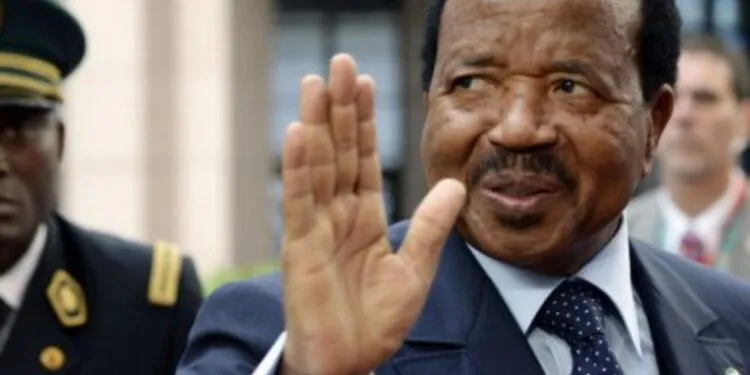The office of the Prosecutor of the International Criminal Court (ICC) has received a complaint against Cameroon’s President, Paul Biya, for crimes against humanity.
The complaint documented evidence of crimes against humanity allegedly committed in Cameroon against its English-speaking minority population. It says government forces have carried out extrajudicial killings, murder, and indirectly tageting civilians.
The Pan African Forum, a platform that defends Africa and its people, recently submitted it. The platform states that Paul Biya and other senior military officials instructed the commission of the mentioned crimes.
Cameroon is not a party to the Rome statute of the ICC. However, members, the UN Security Council, and the ICC’s Prosecutor can only refer cases to the court according to the statute.
Article 15
Filing a case against President Pual Biya and his government at the ICC is under Article 15 of the Rome Statute, which requires the meticulous preparation and detailed evidence to support the alllegations.
However, the platform referred the case based on proprio muto, an official act taken without a formal request from another party. PAF is hoping that with the evidence presented, the office of the prosecutor can launch a preliminary examination and conduct an investigation into the alleged crimes. because, as it stands, the group does not have the legal standing to take a case to the ICC.
Dr. David Nyekorach, the founder/chairman, signed the document laying the complaint. As a result, he is urging an investigation into alleged crimes against humanity and war crimes committed in the Republic of Cameroon, particularly in the Anglophone regions, under Article 15 of the Rome Statute.
“We are aware that despite Cameroon not being a State Party to the Rome Statute, we urge the Office of the Prosecutor to exercise its proprio motu powers and assess whether these acts that I submitted to your office on November 22, 2024, all fall within the ICC’s jurisdiction.” David Nyekorach wrote.
“A summary of alleged crimes is contained in the request submitted to your office with the application that you have now received. The government of President Paul Biya has been implicated in grave violations of international law, including targeted attacks on civilians,” he added.
Synopsis of Anglophone Armed Conflict
In 2016, lawyers and teachers of English extraction in Cameroon’s Northwest and Southwest regions staged a strike to get the government to address grievances of marginalisation and underdevelopment.
The government’s failure to reach an agreement resulted in the brutality of the people protesting for change.
The inability to contain the crisis escalated into an armed conflict in 2017. Meanwhile, the United Nations since 2019 reported that more than 6,000 have been killed and over a million displaced internally and externally.
The population of the two Anglophone regions constitutes just about 20 percent of the French-dominant country.
According to the Pan African Forum, Amnesty International and Human Rights Watch have documented extrajudicial killings, arbitrary arrests, and widespread destruction of villages in the North-West and South-West regions.
It says the conflict has resulted in displacement and suffering and violations of humanitarian law: indiscriminate attacks by government forces and the use of excessive military force against unarmed civilians.
Details of Some Atrocities
In a document sent to the ICC, it stated that the military burnt 50 houses in 2019. It equally pointed out the killings of women and children in Ngarbuh in the Northwest Region in 2020.
“Request for Action is based on the scale and severity of these alleged crimes; we believe the ICC is uniquely positioned to act as a mechanism of accountability where domestic remedies have failed. Specifically, we request a preliminary examination into the situation in Cameroon.” Pan Africa Forum enumerated.
Pan African Forum is aware that Cameroon meets the rationale for ICC intervention, it says, adding that the domestic judicial system in Cameroon is unable or unwilling to prosecute these crimes.
“There is a continued pattern of impunity for those perpetrating atrocities. An ICC investigation would send a strong signal of accountability and could deter further atrocities.” The complaint stated.
PAF believes that the ICC must serve its commitment to justice and accountability not only in the Russia/Ukraine or Israel/Palestine conflicts but also in Africa using PROPRIO MOTU.
“We urge you to take immediate steps to address this critical situation in Africa. The people of Cameroon and the broader international community look to the ICC as a beacon of hope for justice and the protection of human rights.” Said the Pan African Forum
Cameroon Not Signatory to ICC
The state of Cameroon is not a party to the Rome Statute. However, PAF argued that President Paul Biya often seeks medical treatment in Switzerland and pays his hospital bills there. Switzerland’s membership in the Rome Statute means that Biya can face the court.
PAF further justified that the ICC had investigated indicted leaders of countries that are not parties to the Rome Statute. Kenya in 2009 is an example. Recently, the ICC just this year has issued warrants for high-profile personalities in the world. They include Russian President Vladimir Putin and Israeli Prime Minister Benjamin Netanyahu, among others.
The warrant against Putin is based on crimes committed in the ongoing war in Ukraine. Meanwhile, Netanyahu is warranted for the crimes in the Gaza-Israel war. Despite the warrant, the leaders of these two countries are not members of the ICC.
The office of the prosecutor, after receiving the document, responded that it may look into the worries raised.
“Under the Rome Statute of the International Criminal Court, the office of the prosecutor may analyse information on alleged crimes within the jurisdiction of the International Criminal Court,” Karim Khan, ICC’s prosecutor, said.
“This can only occur during preliminary examinations as well as in the context of situations under investigation,” he added.


